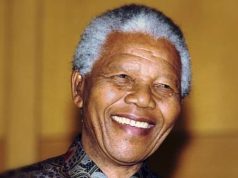JULY 1- US President Barack Obama visits a bleak former prison island off the coast of South Africa on Sunday to pay tribute to ailing anti-apartheid hero Nelson Mandela and set the stage for a speech urging Africans to strive for prosperity and democracy.
Obama is due to cite the legacy of Mandela, who was imprisoned on Robben Island for 18 of the 27 years he spent in jail before becoming the first black president of South Africa, in a speech at the University of Cape Town later in the day.


Some protesters gathered outside the University of Cape Town ahead of Obama’s speech, holding placards attacking U.S. foreign policy reading “Obama mass killer” and “End drone wars now”.
The 94-year-old Mandela’s faltering health has been a sombre backdrop to Obama’s eight-day Africa trip. South Africa’s government says his condition is “critical but stable”.


The US leader describes Mandela as a “personal hero”, and has reminded audiences in Africa in recent days that his first political activism was to urge his US college to divest itself of South Africa investments to protest against apartheid.
On Robben Island, Obama will once again visit Mandela’s cell in the former penal colony, repeating a previous visit he made as a US senator in 2006.
This time he will have his wife and daughters with him. Their tour guide will be 83-year-old former inmate and anti-apartheid activist Ahmed Kathrada
In his speech at the university, Obama will look back to an address the US politician Robert Kennedy gave in Cape Town in 1966 comparing the struggle to overcome apartheid with the US civil rights movement.
Senator Kennedy, the younger brother of US president John Kennedy, was assassinated while running for president in 1968.
Fight for democracy, prosperity


The US president will then challenge his audience not to be content with that progress but to push ahead with battles to lift Africans out of poverty, combat government corruption and improve health and living standards across the continent.
He will also aim to restore some of the lustre of the US relationship with Africa by stressing the US desire to move beyond being an aid donor toward greater economic partnerships.
The speech comes in the middle of an Africa trip that has taken Obama to Senegal and South Africa and will conclude on Monday and Tuesday in Tanzania.
Obama has sought to use the trip to emphasise Africa’s potential as a business partner for the United States and to overcome the perception that he has ignored the continent.
Many Africans are disappointed that despite the US president’s African ancestry – his father was a Kenyan – his only previous visit to the continent while in office was to Ghana in 2009.
The president will unveil a $7 billion US initiative to double access to electric power on a continent where only one in three people have electricity.
While in Cape Town, Obama will also visit a health centre to highlight US efforts to combat HIV/AIDS on the continent, which have contributed to a 32 per cent drop in the number of AIDS-related deaths in Sub-Saharan Africa from 2005 to 2011.








